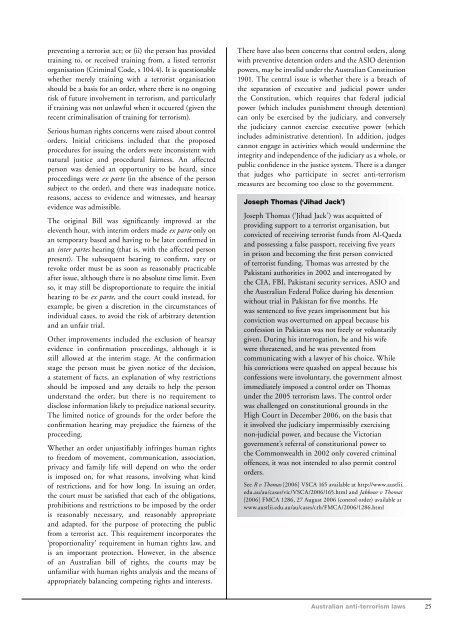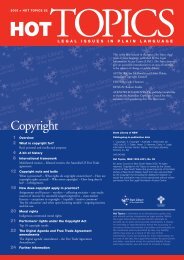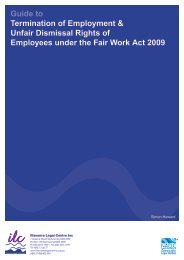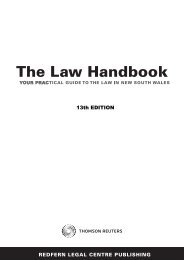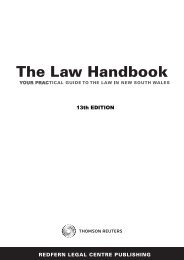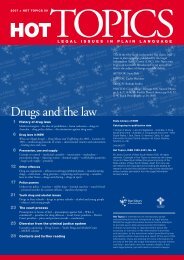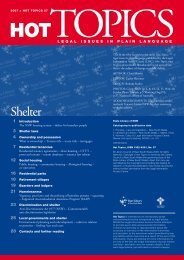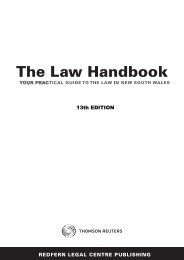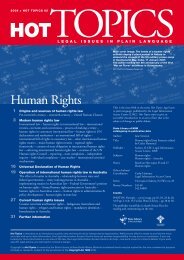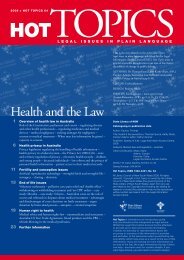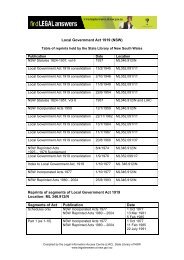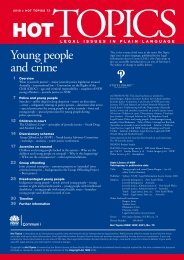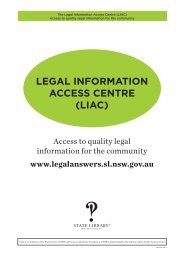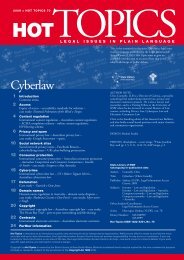Terrorism - Hot Topics 58 - Legal Information Access Centre
Terrorism - Hot Topics 58 - Legal Information Access Centre
Terrorism - Hot Topics 58 - Legal Information Access Centre
- No tags were found...
Create successful ePaper yourself
Turn your PDF publications into a flip-book with our unique Google optimized e-Paper software.
preventing a terrorist act; or (ii) the person has providedtraining to, or received training from, a listed terroristorganisation (Criminal Code, s 104.4). It is questionablewhether merely training with a terrorist organisationshould be a basis for an order, where there is no ongoingrisk of future involvement in terrorism, and particularlyif training was not unlawful when it occurred (given therecent criminalisation of training for terrorism).Serious human rights concerns were raised about controlorders. Initial criticisms included that the proposedprocedures for issuing the orders were inconsistent withnatural justice and procedural fairness. An affectedperson was denied an opportunity to be heard, sinceproceedings were ex parte (in the absence of the personsubject to the order), and there was inadequate notice,reasons, access to evidence and witnesses, and hearsayevidence was admissible.The original Bill was significantly improved at theeleventh hour, with interim orders made ex parte only onan temporary based and having to be later confirmed inan inter partes hearing (that is, with the affected personpresent). The subsequent hearing to confirm, vary orrevoke order must be as soon as reasonably practicableafter issue, although there is no absolute time limit. Evenso, it may still be disproportionate to require the initialhearing to be ex parte, and the court could instead, forexample, be given a discretion in the circumstances ofindividual cases, to avoid the risk of arbitrary detentionand an unfair trial.Other improvements included the exclusion of hearsayevidence in confirmation proceedings, although it isstill allowed at the interim stage. At the confirmationstage the person must be given notice of the decision,a statement of facts, an explanation of why restrictionsshould be imposed and any details to help the personunderstand the order, but there is no requirement todisclose information likely to prejudice national security.The limited notice of grounds for the order before theconfirmation hearing may prejudice the fairness of theproceeding.Whether an order unjustifiably infringes human rightsto freedom of movement, communication, association,privacy and family life will depend on who the orderis imposed on, for what reasons, involving what kindof restrictions, and for how long. In issuing an order,the court must be satisfied that each of the obligations,prohibitions and restrictions to be imposed by the orderis reasonably necessary, and reasonably appropriateand adapted, for the purpose of protecting the publicfrom a terrorist act. This requirement incorporates the‘proportionality’ requirement in human rights law, andis an important protection. However, in the absenceof an Australian bill of rights, the courts may beunfamiliar with human rights analysis and the means ofappropriately balancing competing rights and interests.There have also been concerns that control orders, alongwith preventive detention orders and the ASIO detentionpowers, may be invalid under the Australian Constitution1901. The central issue is whether there is a breach ofthe separation of executive and judicial power underthe Constitution, which requires that federal judicialpower (which includes punishment through detention)can only be exercised by the judiciary, and converselythe judiciary cannot exercise executive power (whichincludes administrative detention). In addition, judgescannot engage in activities which would undermine theintegrity and independence of the judiciary as a whole, orpublic confidence in the justice system. There is a dangerthat judges who participate in secret anti-terrorismmeasures are becoming too close to the government.Joseph thomas (‘Jihad Jack’)Joseph Thomas (‘Jihad Jack’) was acquitted ofproviding support to a terrorist organisation, butconvicted of receiving terrorist funds from Al-Qaedaand possessing a false passport, receiving five yearsin prison and becoming the first person convictedof terrorist funding. Thomas was arrested by thePakistani authorities in 2002 and interrogated bythe CIA, FBI, Pakistani security services, ASIO andthe Australian Federal Police during his detentionwithout trial in Pakistan for five months. Hewas sentenced to five years imprisonment but hisconviction was overturned on appeal because hisconfession in Pakistan was not freely or voluntarilygiven. During his interrogation, he and his wifewere threatened, and he was prevented fromcommunicating with a lawyer of his choice. Whilehis convictions were quashed on appeal because hisconfessions were involuntary, the government almostimmediately imposed a control order on Thomasunder the 2005 terrorism laws. The control orderwas challenged on constitutional grounds in theHigh Court in December 2006, on the basis thatit involved the judiciary impermissibly exercisingnon-judicial power, and because the Victoriangovernment’s referral of constitutional power tothe Commonwealth in 2002 only covered criminaloffences, it was not intended to also permit controlorders.See R v Thomas [2006] VSCA 165 available at http://www.austlii.edu.au/au/cases/vic/VSCA/2006/165.html and Jabbour v Thomas[2006] FMCA 1286, 27 August 2006 (control order) available atwww.austlii.edu.au/au/cases/cth/FMCA/2006/1286.htmlaustralian anti-terrorism laws 25


